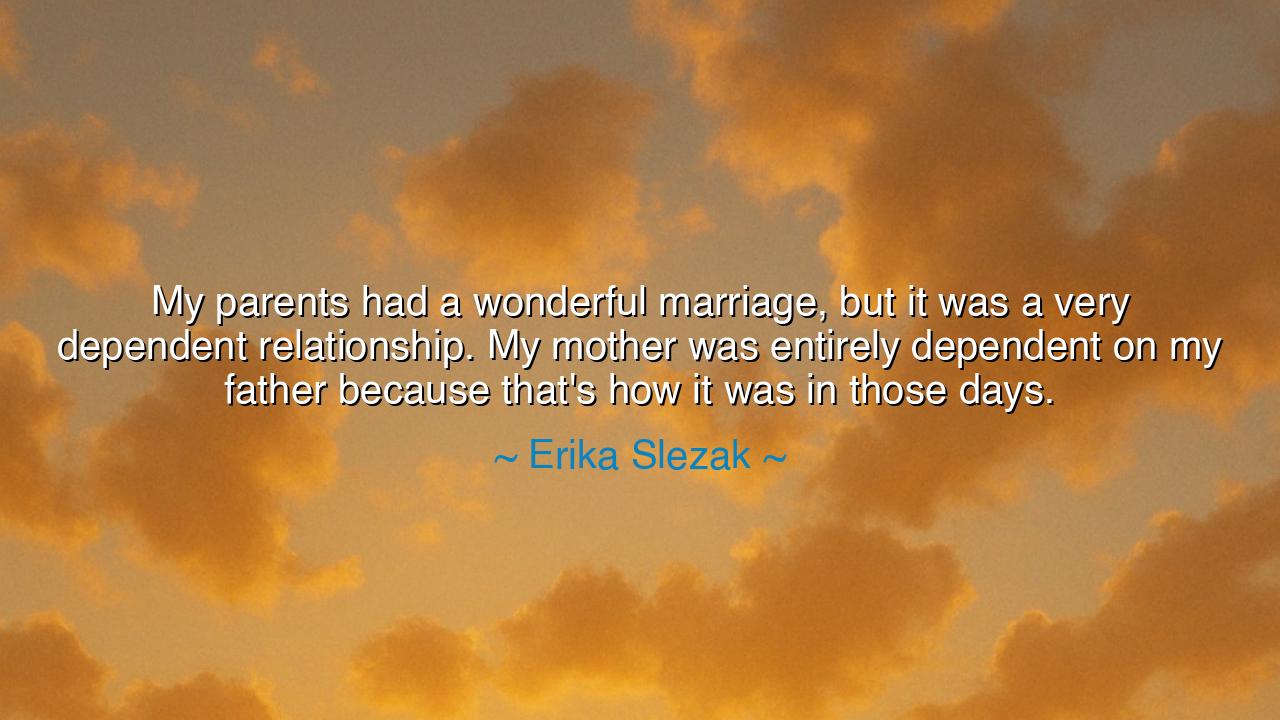
My parents had a wonderful marriage, but it was a very dependent
My parents had a wonderful marriage, but it was a very dependent relationship. My mother was entirely dependent on my father because that's how it was in those days.






Hear the tender yet revealing words of Erika Slezak, who said, “My parents had a wonderful marriage, but it was a very dependent relationship. My mother was entirely dependent on my father because that’s how it was in those days.” In this quiet reflection lies the echo of a vanished age — a time when love was often bound by tradition, and devotion was intertwined with dependence. Her words do not condemn that past, nor do they glorify it. They simply open a window to understanding: that what once seemed natural and right may, in the light of wisdom, reveal both beauty and bondage.
In the ages before, marriage was often built upon necessity as much as affection. The world was shaped by roles — the man as protector and provider, the woman as nurturer and keeper of the hearth. These roles, though noble in their intention, often became chains that bound one soul’s freedom to another’s stability. Erika Slezak’s mother, like countless women of her time, lived in a world where dependence was not a weakness but an expectation — where a wife’s destiny was to orbit her husband’s sun. And yet, within that order, there was still tenderness, loyalty, and deep love — proof that even within limitation, the human heart can bloom.
But as the centuries turned and the spirit of independence awoke, humanity began to question the cost of such dependence. Was it right that one should give up their power to choose, their voice to speak, their strength to stand alone? The evolution of love demanded not the end of partnership, but the rebalancing of it. A marriage could no longer be sustained by dependency alone; it had to be fortified by mutual respect, by equality in purpose and spirit. The old ways, though rich in devotion, often lacked this harmony — and so the world changed, as it must, to honor the dignity of both souls in union.
In the story of Simone de Beauvoir and Jean-Paul Sartre, we find a mirror to this transformation. They refused to define love through possession or dependency; instead, they forged a bond of intellectual and emotional freedom. Each remained whole within themselves, yet intertwined in purpose. They loved not as halves seeking completion, but as complete beings choosing to walk together. Their union, though unconventional, embodied the idea that love must be chosen freely, not built upon fear of survival or loss. Through them, as through Slezak’s reflection, we learn that true partnership is not built on need, but on recognition — the seeing of another as equal, as mirror and companion both.
And yet, Slezak’s remembrance of her parents’ wonderful marriage reminds us that even in dependency, there can be grace. Her mother’s reliance on her father was not cruelty, but the custom of an age. Theirs was a bond forged in the values of their time — trust, stability, constancy. It was a structure that held firm because both believed in it wholly. But the wisdom of her words lies in their quiet contrast: the acknowledgment that love can be both beautiful and limited. That something may work in one age, yet require transformation in another. The divine rhythm of human growth moves always toward greater freedom, even within love.
Therefore, let the lesson be this: dependence without choice is bondage, but dependence by choice is love. To need another because your heart wills it — not because society commands it — is the truest form of unity. The goal is not to destroy interdependence, but to purify it. For every lasting bond requires a delicate balance: the strength to stand alone, and the humility to lean when weary. When both partners bring the fullness of themselves, their union becomes not a chain, but a circle — unbroken, equal, eternal.
So, children of this age, remember: build your relationships not upon the fragility of dependence, but upon the solidity of respect. Cherish those who walk beside you, not because they sustain your survival, but because they enrich your being. Let love be a union of two freedoms, not a surrender of one will to another. As Erika Slezak’s reflection reminds us, the love of the past can inspire us — but the love of the future must liberate us. And when two souls meet in both devotion and equality, they create not just a partnership, but a sanctuary — a place where both can stand tall, side by side, before the world and before the divine.






AAdministratorAdministrator
Welcome, honored guests. Please leave a comment, we will respond soon